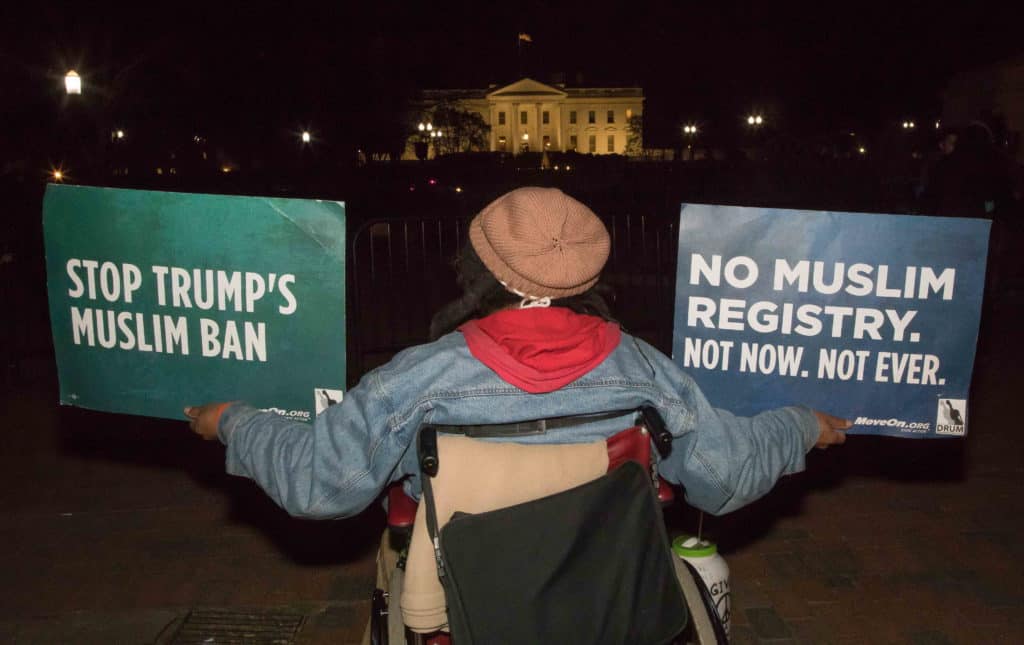Judges Scrutinize Motives of Trump’s Travel Ban as Court Battle Continues
Julia Carrie Wong, The Guardian, May 15, 2017

Credit Image: © Jeff Malet/Newscom via ZUMA Press
Donald Trump’s campaign promise of a “total and complete shutdown” of Muslims entering the United States once again came back to haunt him on Monday.
In Seattle, the president’s prior statements were under scrutiny as three judges from the ninth circuit court of appeals heard oral arguments over whether to continue blocking the president’s second executive order barring travelers from six Muslim-majority countries. The government is seeking to overturn a temporary restraining order issued in March by Judge Derrick Watson of the federal district court in Honolulu, Hawaii, against the executive order.
Trump’s tendency to speak off the cuff about his motivations in issuing the executive order has been a constant presence in hearings, and Monday was no different as the judges considered whether the administration was simply using concerns about national security as a “pretext” for discriminating against Muslims.
Judge Michael Daly Hawkins asked: “Has the president ever disavowed his campaign statements?”
“The executive order sets out national security justifications,” Judge Ronald Gould asked earlier, “but how is the court to know if in fact it’s a Muslim ban in the guise of a national security justification?”
This is the second time that the ninth circuit, which covers the western US and is generally considered the most liberal of the appeals courts, has heard arguments over the travel ban. In February, three different judges on the ninth circuit upheld a temporary restraining order against the first iteration of the travel ban.
The case now awaits a written ruling from the judges, which could be appealed again to the supreme court.
Acting solicitor general Jeffrey Wall, who is representing the government against the legal challenge brought by the state of Hawaii, argued that the court should not consider statements made by Trump when he was a candidate, and should not interpret his post-inauguration statements in a light that was “most hostile and least favorable to the president”. Wall also argued that “over time, the president clarified that what he was talking about was Islamic terrorist groups,” rather than all Muslims.
But Neal Katyal, a former Obama administration solicitor general representing the state of Hawaii in this case, said that Wall could not cite any actual “disavowal” of the campaign promise and pointed to statements Trump has made since his inauguration that he said supported the idea that the executive order is targeted at Muslims.
These include Trump’s statement at the signing of the first executive order, when he read the title of the order and then commented, “we all know what that means”. The statement, which has been interpreted as a wink toward Trump’s campaign promise of a Muslim ban, was cited by Judge Watson in his ruling. Also referenced was a recent interview about Christians in the Middle East in which Trump stated: “I’m going to be helping Christians big league”. Trump’s campaign website included a press release about his call for a ban on Muslims entering the US until the morning of 8 May, when it was deleted moments before the administration argued against a similar temporary restraining order issued by the fourth circuit court of appeals.
“We wouldn’t be standing here if it was just campaign statements,” Katyal said. Overall, he argued, Trump’s statements make clear that the travel ban is an attempt at the “establishment of a disfavored religion”, which violates the establishment clause of the US constitution.
Judge Richard Paez, who is generally considered the most liberal of the three judges on the panel, invoked the specter of Japanese internment during the second world war, a blight on US history that was nevertheless upheld by the supreme court in the case Korematsu v United States.
“Would the Korematsu executive order pass muster under your argument?” Paez asked Wall. “There was no reference to the Japanese in that executive order but look what happened.”
“This case is not Korematsu and if it was I would not be standing here and we would not be defending it,” Wall responded.
Carl Tobias, a law professor at the University of Richmond, said that Judge Paez’s “invocation of Korematsu may suggest his concern about the possibility of executive branch overreach in this case.”
“This and other signs suggested that the judges might be more receptive to the plaintiff’s arguments than the defendant’s,” Tobias added. “But it is always difficult to extrapolate from the argument to the ruling.”
Ultimately, Katyal appealed to the judge’s to rein in the president and maintain the status quo. “If you rule for [the government], you defer to the president in a way history teaches us is dangerous,” he said.















